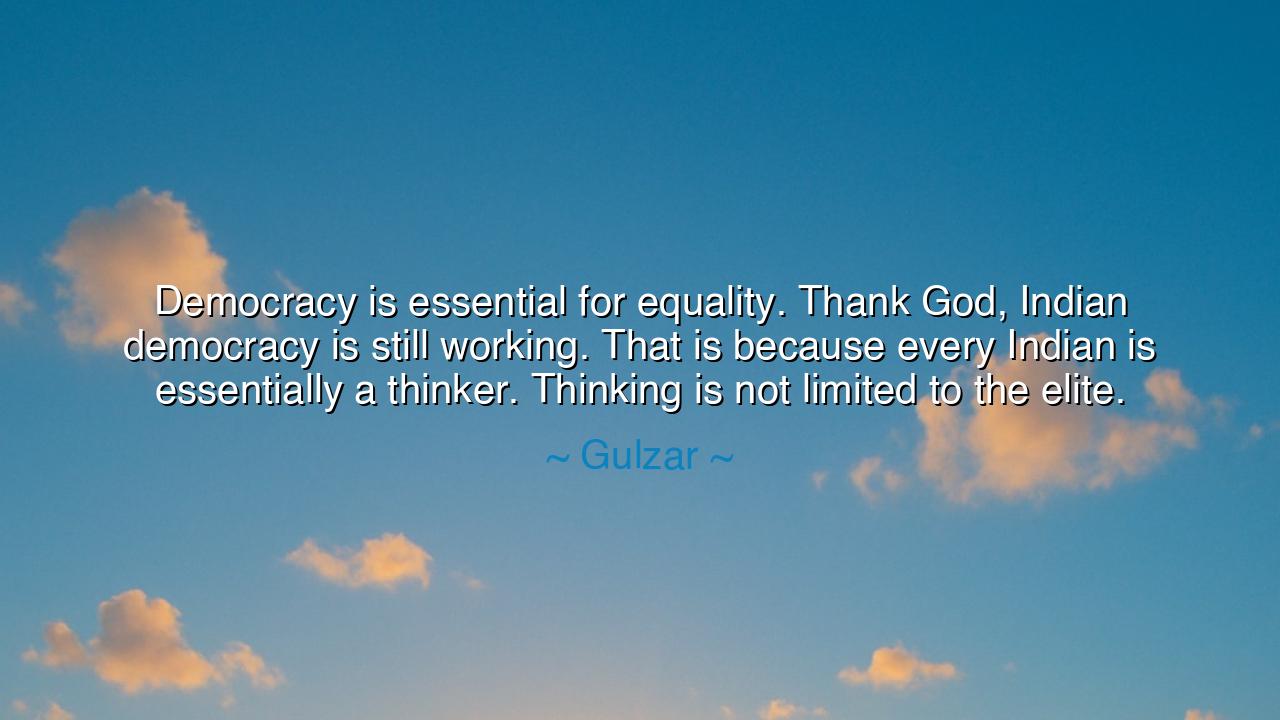
Democracy is essential for equality. Thank God, Indian democracy
Democracy is essential for equality. Thank God, Indian democracy is still working. That is because every Indian is essentially a thinker. Thinking is not limited to the elite.






The words of Gulzar — “Democracy is essential for equality. Thank God, Indian democracy is still working. That is because every Indian is essentially a thinker. Thinking is not limited to the elite.” — are like the song of a poet who has looked deep into the soul of his people. They carry the cadence of gratitude and the weight of truth. Beneath their simplicity lies the profound wisdom of a man who has witnessed the turmoil and triumphs of a nation’s heart. Gulzar, who has woven the spirit of India into his poetry, his films, and his words, reminds us that democracy is not merely a system of governance — it is the breath of equality, the sacred ground on which every mind, humble or exalted, stands as one.
Gulzar, born in the shadow of partition and raised amid the birth of a new nation, has seen both the fragility and the resilience of India’s democratic soul. His words are not those of a politician, but of a seer of humanity — one who understands that democracy survives not because of laws or institutions alone, but because it is nourished by the thinking heart of its people. When he says that “every Indian is essentially a thinker,” he is not praising intellect as privilege — he is honoring consciousness as birthright. In every farmer who questions the rains, in every mother who dreams for her child, in every worker who wonders about fairness, lies the seed of democracy. Thought, he teaches, is not confined to classrooms or palaces; it grows wherever there is life.
The origin of this quote reflects Gulzar’s lifelong meditation on society, equality, and freedom. He belongs to a generation that watched India emerge from colonialism, wounded yet unbroken, into the experiment of self-rule. To him, equality and democracy are not luxuries — they are survival. For a land as vast and diverse as India, democracy is the only bridge between its differences, the only vessel large enough to carry the voices of its billion souls. Without democracy, he warns, the dream of equality would vanish like mist before the sun of power. But with it, even the most ordinary voice may rise to speak truth.
In his words, there is also a quiet warning — that democracy endures only when thought endures. Thinking, he says, must not be the privilege of the educated elite, but the shared labor of every citizen. When the people stop questioning, when the mind ceases to wonder, democracy withers and tyranny takes root. Yet, he rejoices that India’s democracy “is still working,” not because it is perfect, but because its people continue to think, to argue, to care. The Indian street, the village square, the crowded train — all are forums of debate, places where ideas clash and converge. In this endless hum of thought lies the heartbeat of the republic.
Let us look to history, to the example of Mahatma Gandhi, whose philosophy was the embodiment of thought in action. Gandhi was not a scholar in the halls of academia, but a man of the soil, who believed that the smallest act of reflection could change the course of destiny. His salt march was not just a protest; it was a living idea, born from contemplation and faith in the reasoning of ordinary people. He proved, as Gulzar affirms, that “thinking is not limited to the elite.” The humblest peasant, when awakened by thought, becomes more powerful than an empire. So too, every Indian who dares to think keeps the machinery of democracy turning, keeps equality from fading into myth.
Gulzar’s wisdom calls us to remember that democracy is not a gift we inherit, but a task we renew each day. Equality is not achieved by decree, but by dialogue — by listening, questioning, and caring for one another. The great danger of our age is not violence, but apathy — the silence that comes when people stop believing their thoughts matter. But Gulzar assures us that India’s strength lies in its refusal to be silent. Its millions speak in different tongues, yet their thoughts converge upon one truth: that freedom belongs to all.
The lesson, then, is clear: to preserve democracy, we must keep thinking. Let every person, whether scholar or laborer, man or woman, rich or poor, believe in the power of their mind. Let every conversation be an act of citizenship, every question a spark of equality. For democracy dies not when the strong oppress the weak, but when the wise cease to speak. The mind is the true temple of freedom — and in the act of thinking, we worship the divine within us.
So remember, children of India and children of the world: to think is to be free. To question is to serve truth. And to use your mind not for self, but for justice, is to strengthen the fabric of democracy itself. As Gulzar reminds us, the nation does not belong to the powerful, but to the thoughtful. And so long as the hum of thought continues in the streets and hearts of its people, democracy will not merely survive — it will sing, in the many voices of a people united by their right to think, to dream, and to be equal.






AAdministratorAdministrator
Welcome, honored guests. Please leave a comment, we will respond soon